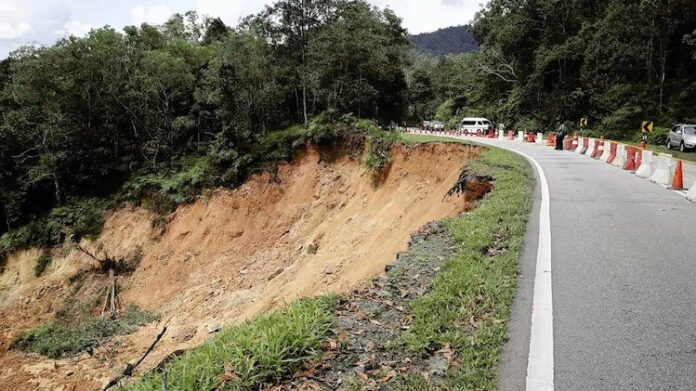The picturesque state of Sikkim, nestled in the lap of the Himalayas, has been dealt a blow as a landslide struck the North Sikkim highway, disrupting essential transportation routes and prompting authorities to halt tourist permits for the scenic town of Lachung. The incident, which occurred amid the monsoon season, underscores the vulnerability of the region’s infrastructure to natural disasters and the challenges faced by authorities in managing tourism amidst such adversities.
The landslide on the North Sikkim highway has caused significant damage to the road, rendering it impassable for vehicles and disrupting the flow of traffic to remote areas in the northern part of the state. The affected stretch of the highway, a lifeline for residents and businesses in the region, is now strewn with debris and boulders, making it hazardous for travel. The landslide has also raised concerns about the safety of travelers and the resilience of Sikkim’s infrastructure in the face of natural calamities.
One of the immediate consequences of the landslide has been the suspension of tourist permits for Lachung, a popular destination known for its breathtaking landscapes, cascading waterfalls, and vibrant local culture. The decision to halt tourist permits is a precautionary measure aimed at ensuring the safety of visitors and preventing potential accidents or disruptions due to the unstable road conditions. Authorities have advised tourists to defer their travel plans until the situation improves and the highway is deemed safe for travel.
The suspension of tourist permits for Lachung comes as a setback for the tourism industry in Sikkim, which has been gradually recovering from the impact of the COVID-19 pandemic. Tourism plays a vital role in the economy of the state, providing employment opportunities and generating revenue for local businesses. The suspension of permits is likely to have ripple effects on the livelihoods of those dependent on tourism-related activities, including tour operators, hoteliers, and vendors.
The landslide on the North Sikkim highway is a stark reminder of the challenges posed by the region’s rugged terrain and unpredictable weather patterns. Sikkim, with its mountainous terrain and dense forests, is prone to landslides, flash floods, and other natural disasters, especially during the monsoon season. The state’s infrastructure, including roads, bridges, and communication networks, often bears the brunt of such calamities, highlighting the need for robust disaster preparedness and mitigation measures.
In recent years, the government of Sikkim has undertaken various initiatives to enhance the resilience of the state’s infrastructure and improve disaster management capabilities. These efforts include the construction of retaining walls, slope stabilization measures, and early warning systems to mitigate the impact of landslides and other natural hazards. However, the recent landslide serves as a reminder that more needs to be done to safeguard the lives and livelihoods of the people of Sikkim.
The suspension of tourist permits for Lachung also raises broader questions about the sustainability of tourism in ecologically sensitive areas. Lachung, with its pristine natural beauty and rich biodiversity, attracts thousands of tourists each year, eager to explore its scenic landscapes and experience its unique culture. However, unchecked tourism development can put pressure on fragile ecosystems, leading to environmental degradation and loss of biodiversity.
In response to these challenges, authorities in Sikkim have been working to promote sustainable tourism practices that balance the needs of visitors with the conservation of natural resources. Initiatives such as eco-tourism, community-based tourism, and responsible travel campaigns are being implemented to minimize the negative impacts of tourism on the environment and support local communities.
As the state grapples with the aftermath of the landslide and the suspension of tourist permits for Lachung, there is an opportunity to reevaluate tourism policies and practices to ensure that they are in line with principles of sustainability and resilience. By prioritizing the protection of natural habitats, promoting responsible tourism behavior, and investing in infrastructure that can withstand the vagaries of nature, Sikkim can continue to thrive as a premier destination while preserving its natural heritage for future generations to enjoy.
In addition, the landslide on the North Sikkim highway and the subsequent halt in tourist permits for Lachung highlight the complex interplay between tourism, infrastructure, and natural hazards in the region. As Sikkim navigates through these challenges, it must adopt a holistic approach to tourism development that prioritizes safety, sustainability, and the preservation of its unique cultural and ecological heritage. Only then can the state continue to attract visitors while safeguarding the well-being of its people and the environment.

